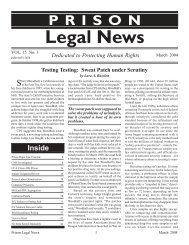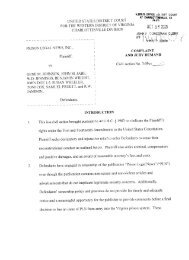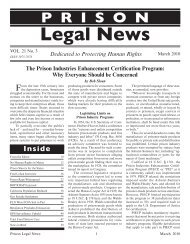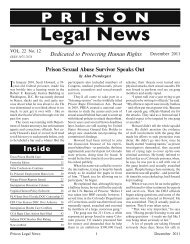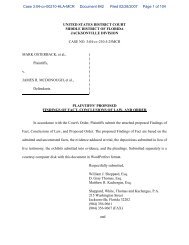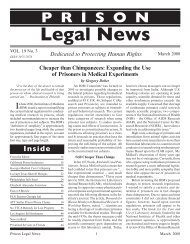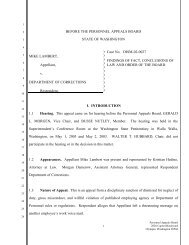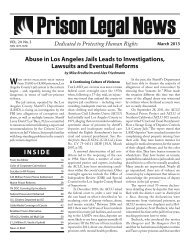From the Editor - Prison Legal News
From the Editor - Prison Legal News
From the Editor - Prison Legal News
Create successful ePaper yourself
Turn your PDF publications into a flip-book with our unique Google optimized e-Paper software.
Cost Shifting (cont.)<br />
shift costs or cut <strong>the</strong>m. At a minimum<br />
we must evaluate whe<strong>the</strong>r cost-recovery<br />
sanctions are achieving <strong>the</strong> stated goals<br />
of policymakers. This article’s review of<br />
<strong>the</strong> evidence suggests <strong>the</strong>y are not.<br />
Does Imposition Of Cost-Recovery<br />
Sanctions Limit The Public’s<br />
Financial Burden?<br />
Evidence suggests <strong>the</strong>y may not for<br />
two main reasons. First, recovering monies<br />
from people may be akin to drawing<br />
blood from a stone. When one cannot<br />
find a job and when one is faced with<br />
o<strong>the</strong>r mandatory financial obligations,<br />
like child support, one simply may not<br />
have money left to pay <strong>the</strong> system’s costs.<br />
The public savings suggested in <strong>the</strong> budget<br />
ledgers, <strong>the</strong>refore, may never materialize.<br />
Moreover, because cost-recovery sanctions<br />
are often levied against <strong>the</strong> poor,<br />
fur<strong>the</strong>r research is needed to determine<br />
whe<strong>the</strong>r payments made actually come<br />
from o<strong>the</strong>r sources of public dollars –<br />
like public benefits. Whe<strong>the</strong>r <strong>the</strong> public<br />
is paying <strong>the</strong> cost of <strong>the</strong> criminal justices<br />
system directly or indirectly, through <strong>the</strong><br />
transfer of public benefit dollars to pay<br />
down criminal debt, <strong>the</strong> evidence suggests<br />
cost-recovery sanctions do little to relieve<br />
<strong>the</strong> public’s financial burden.<br />
Does Imposition Of Cost-Recovery<br />
Sanctions Limit Tax Payer Burden?<br />
The evidence suggests tax payers, albeit<br />
a potentially narrower slice of <strong>the</strong>m, are paying<br />
<strong>the</strong>ir taxes as well as <strong>the</strong> cost-recovery<br />
sanctions that allegedly reduce <strong>the</strong>ir tax<br />
burden. Individuals assessed <strong>the</strong> fees may<br />
also be taxpayers, holding down tax-paying<br />
jobs while on work release or under community<br />
supervision, and still be assessed<br />
additional costs to cover <strong>the</strong> system. Family<br />
members of those in <strong>the</strong> system face a triple<br />
threat – <strong>the</strong>y pay taxes (that cover <strong>the</strong> cost<br />
of <strong>the</strong> system), contribute to jail and prison<br />
inmate accounts (that officials intercept to<br />
cover <strong>the</strong> cost of <strong>the</strong> system), and may help<br />
released bro<strong>the</strong>rs, mo<strong>the</strong>rs, daughters, and<br />
fa<strong>the</strong>rs to repay old fees and new ones (like<br />
probation supervision costs).<br />
Does Imposition Of Cost-Recovery<br />
Sanctions Ensure Crime Victims Are<br />
Properly Compensated?<br />
Imposition of cost-recovery sanctions<br />
actually seems to undermine <strong>the</strong> penological<br />
goals of <strong>the</strong> system – including crime<br />
April 2008<br />
victim compensation. These additional<br />
financial burdens create competition<br />
among victims and justice system administrators<br />
for pieces of a small pie.<br />
Does Imposition Of Cost-Recovery<br />
Sanctions Allow Policy Makers To<br />
Appear Fiscally Responsible?<br />
This rationale for promoting costshifting<br />
to people in <strong>the</strong> system is an<br />
interesting one, focused on appearances<br />
ra<strong>the</strong>r than sound policy. Even if appearances<br />
were a legitimate basis for<br />
making policy, <strong>the</strong> evidence suggests<br />
<strong>the</strong>se impositions do not reflect favorably<br />
on policymakers. To <strong>the</strong> contrary,<br />
cost-shifting demonstrates willingness<br />
to place political expediency over true<br />
fiscal responsibility which requires tough<br />
decisions about cutting costs and raising<br />
revenues. The ability to impose costs on<br />
<strong>the</strong> criminal system’s captive audience<br />
allows policymakers to avoid <strong>the</strong>se hard<br />
questions, and to avoid disappointing<br />
those with a fiscal interest in keeping jails<br />
and prisons full.<br />
Does Imposition Of Cost-Recovery<br />
Sanctions Teach Moral Lessons<br />
And Fiscal Responsibility?<br />
For many people leaving prison,<br />
criminal financial obligations hang over<br />
<strong>the</strong>ir heads like <strong>the</strong> Sword of Damocles,<br />
ready to drop at any moment. High<br />
criminal debt and low earning potential<br />
combine to frustrate efforts to achieve<br />
financial and social stability, and to live<br />
up to one’s obligations to family and community<br />
after involvement in <strong>the</strong> system.<br />
Research in <strong>the</strong> child support context<br />
illustrates a tipping point at which <strong>the</strong><br />
size of debt relative to income creates an<br />
unwanted backlash. Studies show that<br />
compliance with child support orders is<br />
strongly linked to abilty to pay, and that<br />
compliance was significantly lower when<br />
monthly orders were more than 20 percent<br />
of a parent’s income, than when orders<br />
were 15 percent or less of income 101 . If<br />
criminal financial obligations are aimed at<br />
fur<strong>the</strong>ring responsibility, <strong>the</strong>y cannot be<br />
so burdensome as to make work futile.<br />
Policymakers Must Reconsider The<br />
Use Of Cost-Recovery Sanctions<br />
20 dollars here, 15 dollars <strong>the</strong>re -- for<br />
a busy legislator focused on ending <strong>the</strong> fiscal<br />
year in <strong>the</strong> black, enacting <strong>the</strong>se types<br />
of monetary sanctions may appear to be<br />
sensible, relatively painless, financial fixes.<br />
But as lawmakers continue to shift more<br />
10<br />
and more of <strong>the</strong> costs of <strong>the</strong> criminal justice<br />
system onto those arrested, charged,<br />
prosecuted, and incarcerated, it is critical<br />
that <strong>the</strong>y understand <strong>the</strong> entire economic<br />
sanctions picture, and resist <strong>the</strong> current<br />
piece-meal approach. Across <strong>the</strong> country,<br />
both those burdened with <strong>the</strong> debt,<br />
as well as state policymakers, probation<br />
officers, judges, and court administrators<br />
increasingly understand <strong>the</strong> big picture,<br />
and are troubled by it. They are urging<br />
reconsideration of existing cost-recovery<br />
fees and cautioning against creation of<br />
new ones.<br />
Policymakers can heed <strong>the</strong>ir call by:<br />
1) conducting (and regularly updating) an<br />
inventory of all criminal fees, fines and<br />
economic sanctions on <strong>the</strong>ir books; 2)<br />
performing an impact analysis when a new<br />
economic sanction is proposed that includes<br />
assessment of <strong>the</strong> population most<br />
likely to face <strong>the</strong> sanction, <strong>the</strong> amount of<br />
sanctions already paid by that population,<br />
and <strong>the</strong> proposal’s effect on public safety;<br />
and 3) instituting a moratorium on new<br />
sanctions or sanction increases until <strong>the</strong><br />
proper research and impact procedures are<br />
in place. Without protections like <strong>the</strong>se,<br />
responsible decision-making in <strong>the</strong> area<br />
of criminal economic sanctions is simply<br />
not possible.<br />
Endnotes<br />
1 The author wishes to thank Nora Christenson,<br />
a Brennan Center summer intern, and Bran<br />
Noonan, a volunteer lawyer, for <strong>the</strong>ir essential<br />
research and drafting for this article, as well as Brennan<br />
Center colleagues Lynn Lu, for her tireless work<br />
on all aspects of this chapter, and Chris Muller for<br />
his always helpful review and insights. Finally, <strong>the</strong><br />
author thanks Rene Kathawala, Mick Peters, and<br />
<strong>the</strong>ir firm, Orrick, Harrington, and Sutcliffe, LLP,<br />
for <strong>the</strong>ir expert cite-checking.<br />
2 Michigan State Senator Alan Cropsey, chair of<br />
<strong>the</strong> Judiciary Committee and member of <strong>the</strong> Appropriations<br />
Committee, Karen Imas & Rachel McLean,<br />
The Council of State Governments Eastern Regional<br />
Conference, Issue Brief, “Policymakers Discuss Practical<br />
Solutions to Financial Obligations of People<br />
Released from <strong>Prison</strong>s and Jails,” 1, May 2006.<br />
3 The Honorable Judge John Andrew West of<br />
<strong>the</strong> Court of Common Pleas in Ohio, Karen Imas &<br />
Rachel McLean, The Council of State Governments<br />
Eastern Regional Conference, Issue Brief, “Policymakers<br />
Discuss Practical Solutions to Financial<br />
Obligations of People Released from <strong>Prison</strong>s and<br />
Jails,” 2, May 2006.<br />
4 NAACP <strong>Legal</strong> Defense and Educational<br />
Fund, Inc., website, http://www.naacpldf.org/content.aspx?article=524.<br />
5 Appeals Court Decision and Opinion Va-<br />
<strong>Prison</strong> <strong>Legal</strong> <strong>News</strong>



